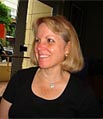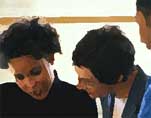Interview with Anne HolbrookPresidential Award for Elementary Science Teaching, 1993 |
 |
Anne Holbrook teaches elementary science in southern Ohio. She has received numerous awards for teaching and has shared her learnings with other teachers at several southern Ohio universities, where she has taught both graduate and undergraduate pre-service teachers.
How did you get started in supporting pre-service education?
I started out with the elementary certification in all subjects and then went back to get my master’s to be a reading specialist. I discovered that I had a very poor background in science and decided to start taking some graduate courses in science. I changed my whole way of teaching in both math and science and, along the way, started getting some awards. I decided to share my experiences and knowledge with other teachers and began teaching as an adjunct professor of the University of Cincinnati, Miami University, and then Shawnee State University. I’ve taught graduate-level courses for veteran teachers and undergraduate classes for pre-service teachers.
How did you juggle your teaching responsibilities and pre-service work?
Most pre-service courses can be taught on the weekend or in the evening. I wouldn't teach more than one class during the school year because you're going to cheat somebody out of your time and effort. When I teach a course full-time, it’s usually every day for a seminar with teachers during the summertime.
If you live in a rural area or aren’t able to make it to a site to teach, there’s now the possibility of teaching a course online and doing Webcasts. That’s another venue that teachers can use that maybe they haven’t thought about before. The University of Phoenix offers a lot of online courses. For teachers who do choose to do that, I would suggest helping pre-service teachers learn that model of teaching as well.
What advice would you give to a teacher who wants to get involved in supporting pre-service education?
To influence young teachers, the teacher has to feel very comfortable with a field and also with her own way of teaching and should have been very successful modeling this teaching. I have discovered that you need a really concentrated background in the subject area that you're teaching to pre-service teachers, because often with the changes and new state regulations, student teachers have more science background than they’ve ever had before. And so you're not starting out with teachers with very few concepts. Often times what you're dealing with are teachers who need to know more how to teach the science and less what the science concepts are. That’s the opposite from the veteran teachers I teach. They are lacking concept knowledge and how to teach the concepts, while with the younger teachers, usually it’s in how to teach it and how to manage your classroom while you're teaching it. So those who want to get involved with pre-service teachers have to make sure that they are very, very comfortable with what they know and how they teach it. You have to teach it the same way to these teachers. You can’t tell them to teach one way and then lecture them how to teach it. You have to keep in mind you're always modeling what you're doing.
I believe that one of the biggest things teachers can do is open their classroom up for observations. Unfortunately, many teachers don’t open up their classrooms. It’s important to remember that no one teaches perfectly all the time to every student. Pre-service teachers often have a great deal of difficulty with classroom management; an experienced teacher who does it without thinking about it can help. So open up your classroom for observations and have pre-service teachers come in and teach a unit.
When I was teaching at Miami University and the University of Cincinnati, I would have some pre-service teachers come in to my class. A lot of the work we did together had to do with their management skills. They really had no clue how to get the kids’ attention to do something. They had made beautiful plans but couldn't zero in on what they were supposed to do with them. I think it was really, really helpful for them to have an opportunity to learn how to do different things. Four of the teachers I had come into my classroom later came back and worked for the district. They just discovered it was something that they did enjoy doing, and they felt that they had learned quite a bit. In all cases, they were very successful. With pre-service teachers, a lot of it is discovering what they like or dislike, and, once they figure out where their niche is, going on and teaching and modeling how to teach and manage their classrooms.
What advice would you give to a teacher who wants to mentor pre-service teachers?
I’ve mentored 18 students online from Shawnee State. When they had a question, they would contact me. They could really ask me anything. They really liked having an experienced teacher they could be in e-mail contact with. Having someone that they can talk to helps the pre-service teachers feel less isolated. There is a real need for a more widespread system like this that would offer teachers experienced mentors such as the Presidential Awardees.
With pre-service teachers who come into your classroom to co-teach or observe, the key is to keep the lines of communication open. Let them know that there isn’t any question that's stupid or unnecessary or undesirable. I would have students e-mail me or just call me and ask questions about what was going on. With student teachers, I always waited for them to get comfortable before having them teach the class. Until they had a comfort level, it doesn’t work very well. You can’t just throw them in and say, “sink or swim.” I’ve had student teachers who, at the end of the first week, could talk with me about what they could do the second week, and they would slowly take on one class a week until by the end of their internship, they were doing a whole day without any trouble or help. But, I’ve also had some who took a couple of weeks just to feel comfortable, yet they weren’t any better or worse than the others. Once they’re more comfortable, you can have them take on some activities. Have them start with activities with which they’re the most knowledgeable so they feel they’re successful. They will slowly build on that success.
Also make sure that you’re not too critical of what they’re doing. Often times I find that if I noticed something they were doing that really wasn’t very effective, I would model that particular thing for them without being obvious about it. Or if they mention that they’re struggling with something, I suggest trying a few different things and see what works best for them. Different things will work for different people, depending on their style and personality.
How can practicing teachers support future teachers while they’re still in secondary school?
I started out having high school kids who were undecided about whether or not they wanted to be teachers come into my classroom. High school teachers I knew have shared with me that some of their students were interested in teaching but still weren’t sure. They were going off to college and just didn't feel good about it. These students were invited to come to my class on different days. They would come in after high school let out and read books, do flashcards with kids who have some difficulty with some basic words, or play word games with them. This allowed them the opportunity to work with kids to find out if this was something they really wanted to do. Some were comfortable working with kids, others weren’t so comfortable. Usually by the end of the school year, they visited maybe 20 or 25 times. They were much more comfortable with the children and felt they did have something to give to the kids—this did not necessarily mean that teaching was for them, though. Some did go on into education, but it was interesting to see that others were undecided but not negative about teaching.
How can practicing teachers support undecided undergraduates?
You can have students from the universities come in for observations. They’re usually within their first two years and want to see if teaching is what they want to do. I’ll ask, “Well, what makes you undecided?” If it’s the fact that they don’t know whether or not they could be around kids all the time, that's not such a good thing. But if they’re just frightened about trying to manage all of the students or wondering if they will be as good as the teachers they’ve had, I tell them, “Just the fact that you bring up those concerns tells me that's something you're going to work on really hard.”
Do practicing secondary school teachers co-teach with professors in college math and science content courses for pre-service teachers?
I co-taught pre-service teachers at Shawnee State University with the chair of the Department for Science Education. One of the things a teacher could do with a professor that's on staff is to co-teach and set up types of different outings and field trips to give students an opportunity to get a bigger scope of what teaching’s all about, especially if they are in small isolated areas. Chances are that their jobs are not going to be in a small isolated area, and they will end up teaching in cities and dealing with problems they have never seen before. Often times, professors don’t have the links to be able to give pre-service teachers the real experiences, whereas a practicing teacher would know where to find those.
How do you think your experiences in pre-service education contribute to the advancement of science reform?
Reform is necessary and needs to begin at both ends of the spectrum—the pre-service teachers and veteran teachers. Naturally, the types of enhancement to their college and life/work experiences are different and different plans for re-education and preparation need to be developed for them. These sessions in learning need to model the way science reform should be done for all age learners. When the colleges begin teaching science and math concepts by inquiry, then I know the task of teaching for learning has been accomplished.
If you have any questions you would like to ask Anne Holbrook about her experiences in supporting pre-service education, contact her at aholbroo@earthlink.net

